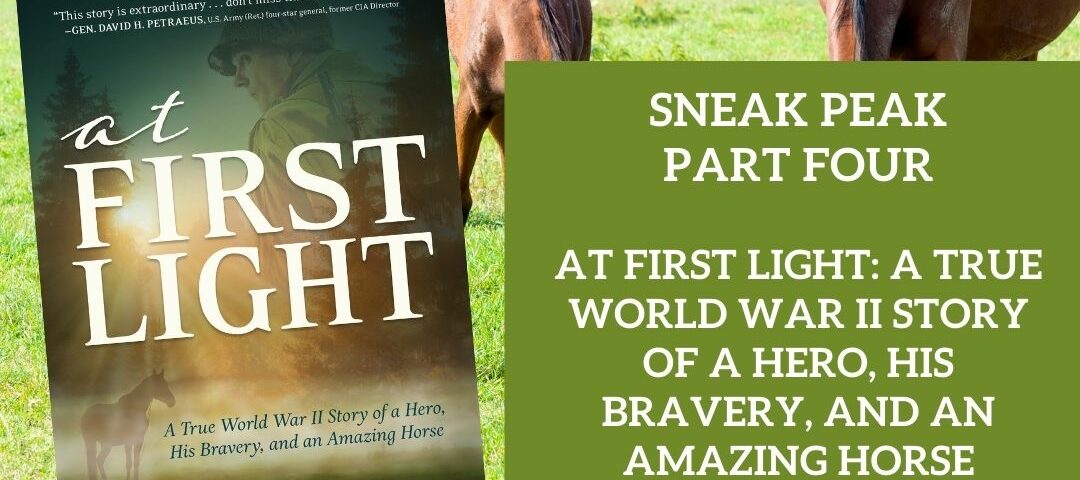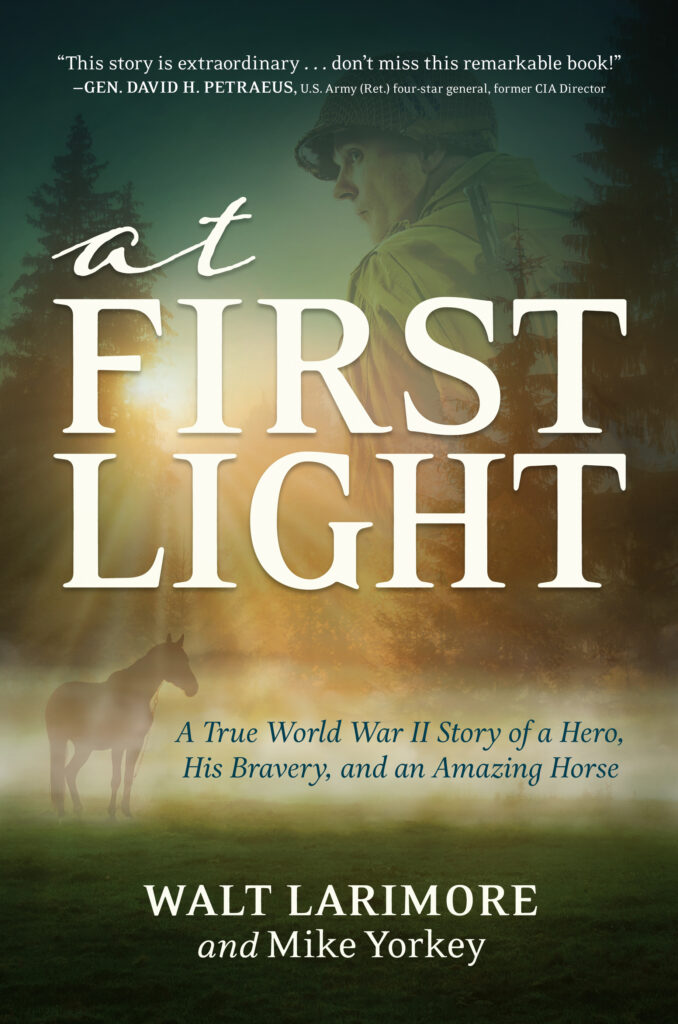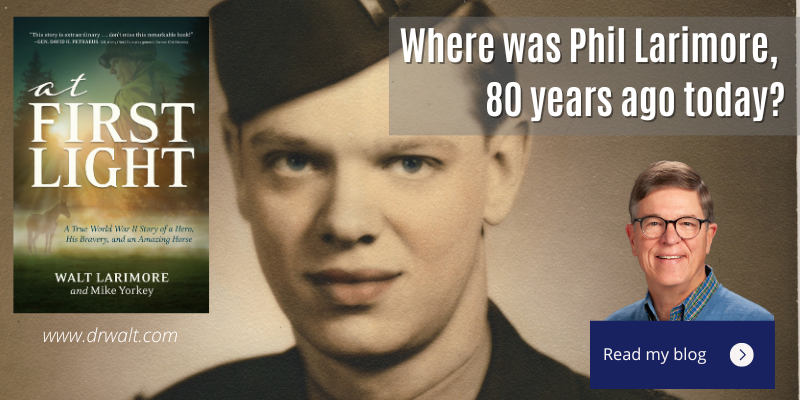SNEAK PEAK – Part Four – At First Light: A True World War II Story of a Hero, His Bravery, and an Amazing Horse

Fit Over 50 — Dr. Walt with Dr. Dobson on his national Family Talk radio program (Part Two)
April 22, 2022
Does caffeine cause bone thinning or osteoporosis?
April 25, 2022SNEAK PEAK – Part Four – At First Light: A True World War II Story of a Hero, His Bravery, and an Amazing Horse
With the permission of my publisher, for the month of April, I’m giving you a SNEAK PEEK of the first five chapters of my latest book — a wonderful story about my father’s heroism and exploits before and after World War II. Here’s CHAPTER THREE of At First Light: A True World War II Story of a Hero, His Bravery, and an Amazing Horse.
“I spent the majority of my life fighting battles on the football field—thirty years in the National Football League, nine Super Bowls, and legendary classics like the famous ‘Ice Bowl.’ I’ve told my ‘war stories’ from the NFL for years, but none of my tales come close to the captivating story shared by Walt Larimore in At First Light, a war story about his father who fought to protect the very freedoms you and I enjoy in this country we love.”
—Dan Reeves, Super Bowl Champion and record-setting NFL player and coach
Order Here
CHAPTER THREE
A DAY OF INFAMY
“Great crises in human affairs call out the great in men. They call for great men.”
—Brevet Major General Joshua L. Chamberlain, Union Civil War general and Medal of Honor recipient after the Battle of Gettysburg
On Saturday evening, December 6, 1941, “Phil,” as Marilyn called him and as he now liked to be called, took her out for dinner at the Bungalow, a popular seafood restaurant in Biloxi, Mississippi that overlooked the calm, brown waters of the Mississippi Sound. The menu had something for every taste: fresh seafood, choice steaks, Southern fried chicken, Cajun specials, and even Chinese dishes. After enjoying the surf-and-turf special, the young couple decided to go to the cinema.
Marilyn had wanted to see the romance, Johnny Eager, starring Lana Turner and Robert Taylor. In contrast, Phil had a yearning to watch Tarzan’s Secret Treasure, starring Maureen O’Sullivan alongside his favorite movie star, Johnny Weissmuller, one of the world’s fastest swimmers. They compromised with Ball of Fire, starring Gary Cooper and Barbara Stanwyck.
The next morning dawned clear with unlimited visibility and an unseasonably warm fifty-nine degrees predicted as the high. Rather than attending church together, which was their habit, Phil and Marilyn decided to play hooky. He picked her up early, and they trailered their horses to the nearby De Soto National Forest, where they rode through the gently rolling terrain.
When they located Black Creek, Mississippi’s only National Scenic River, they followed the meandering ribbon of water until they found a wide white sandbar. There they set out a picnic lunch and talked for hours in the warm sunshine about their hopes and dreams—and, for the first time, about the prospects of a life together.
Late in the afternoon, they returned to the stable and found a group of people gathered around a radio. “Whatcha listening to?” Phil asked. The men shushed him as he and Marilyn leaned closer to listen.
The announcer blurted, “This is KTU in Honolulu, Hawaii. I am speaking from the roof of the Advertiser Publishing Company Building. We have witnessed this morning the severe bombing of Pearl Harbor by enemy planes, undoubtedly Japanese…. This is no joke. It is a real war… There has been serious fighting going on in the air and on the sea.”
Phil and Marilyn’s eyes met, and he pulled her close. There was another second or two of static. Then the announcer continued, “We cannot estimate just how much damage has been done, but it has been a very severe attack.”
The sound of rustling papers came through the small radio as the announcer took a deep breath. “Oh, this is much worse than we’ve heard up to now. The BBC is now reporting, and I quote, ‘At oh seven fifty-five local time, the first wave of between fifty and one-hundred-fifty planes struck the naval base for thirty-five minutes, causing several fires and untold damage to the Pacific Fleet. The Japanese squadrons dropped high explosive and incendiary bombs. A second strike followed at about oh nine hundred when a force of at least one hundred planes pounded the base for an hour,’ end quote.”
Phil looked at his watch. This meant the attack had started just before 1 p.m. in Gulfport, located in the Central Time Zone.
The broadcaster continued, “The BBC also says, and I quote, ‘The Times newspaper’s Washington correspondent says the U.S. government expects Germany and Italy to declare war on the U.S. within hours. Although the attack has shocked the American people, there is little doubt that it has been brewing for some years,’ end quote.”
Marilyn began to cry; Phil pulled out his handkerchief and handed it to her. “Oh, Phil,” she muttered, “This can’t be happening, can it?” He could only hold her close as a zillion thoughts raced through his mind. Their shared disbelief mirrored their astonishment.
The announcer paused a moment, and the clacking of a teletype machine could be heard. “This just in. This just in. Japan declares war! Japan declares war!”
Someone whispered to the man. The pitch of his voice increased as he announced, “This wire is just in from Hirohito, the Emperor of Japan. Here are his words, and I quote, ‘We, the Emperor, hereby proclaim unto our loyal and valorous subjects that we have now declared war upon the United States of America and Great Britain,’ end quote.”
Phil’s mind swirled. He thought, So, this is it. This is really it. Soon, I’ll be off to war. I’ll be going into battle. He couldn’t have imagined such a confluence of excitement and horror occurring in one moment. Marilyn continued to weep in his arms.
“I have to get back to GCMA. Now!” he said.
She nodded. They ran to the car and sped away.
*****
THe next morning, Monday, December 8, the nation awoke to even more bad news: the extent of the damage from the surprise attack on Hawaii. At that point, no one knew that the Japanese attack had killed 2,403 U.S. personnel, including sixty-eight civilians, and destroyed or damaged nineteen U.S. Navy ships, including eight battleships, and destroyed or damaged 328 aircraft.
Not even the U.S. government was aware that the ship with the most lives lost, the battleship USS Arizona, would report 1,177 dead—meaning that about one half of those who perished at Pearl Harbor were on the Arizona. What everyone did know was that Japan also attacked the Philippines, Wake Island, and Midway on the morning of December 7. The only good news was that the three aircraft carriers of the U.S. Pacific Fleet had been out to sea on maneuvers.
After a hastily arranged Protestant church service at GCMA, Phil received a call from his father. He had been working on the train running between New Orleans and Memphis. At a stop in Water Valley, Mississippi, Phil Sr. had been given a handwritten note:
Do not permit any Japanese to ride your train. Orders of the Federal Bureau of Investigation.
Then Phil and his fellow cadets attended a solemn assembly at 11:30 a.m., during which they listened intently to the nationwide radio broadcast of President Franklin D. Roosevelt’s address to a joint session of Congress inside the U.S. Capitol. The President started his speech with these memorable words:
Mr. Vice President, Mr. Speaker, Members of the Senate and the House of Representatives. Yesterday, December 7, 1941, a date which will live in infamy, the United States of America was suddenly and deliberately attacked by naval and air forces of the Empire of Japan.
After recounting details of the aerial assault, the President concluded his speech with this:
No matter how long it may take us to overcome this premeditated invasion, the American people in their righteous might will win through to absolute victory. I believe that I interpret the will of the Congress and of the people when I assert that we will not only defend ourselves to the uttermost but will make it very certain that this form of treachery shall never again endanger us.
With confidence in our armed forces, with the unbounding determination of our people, we will gain the inevitable triumph—so help us God. I ask that the Congress declare that since the unprovoked and dastardly attack by Japan on Sunday, December 7, 1941, a state of war has existed between the United States and the Japanese empire.
The roars of approval and tsunami of applause from the members of Congress could be heard over the speakers, and was joined by the young GCMA cadets as they bounded to their feet, throwing their caps toward the ceiling, and hugging and swatting one another on the back. As the cheers faded, though, they became aware that America was about to face an extraordinary test—one that would potentially threaten her very being. The young men at GCMA knew that their training put them in a position to quickly make a difference and play a significant role in the days ahead.
The next five months flew by, and on a beautiful, cloudless, and calm seventy-degree Saturday, May 16, 1942, Phil graduated with honors from GCMA and the Reserve Officers Training Corps, or ROTC.
Before Pearl Harbor, he had planned to begin pre-med studies that fall, but with America in the midst of a global conflict against the Axis powers, he realized that he would not be studying medicine anytime soon.
Philip Larimore Jr. understood that he was destined for war.
Order Here
© Copyright WLL, INC. 2022.






